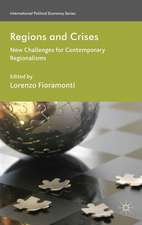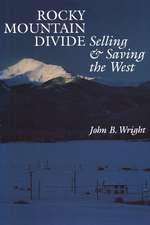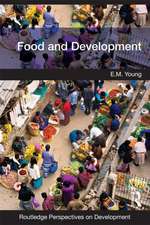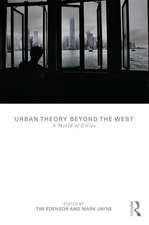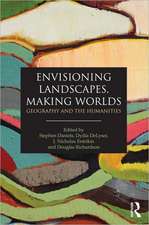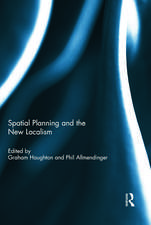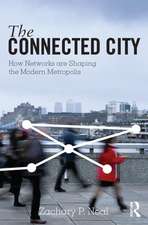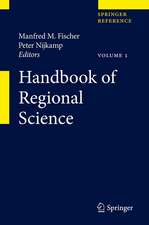Clashes of Knowledge: Orthodoxies and Heterodoxies in Science and Religion: Knowledge and Space, cartea 1
Editat de Peter Meusburger, Michael Welker, Edgar Wunderen Limba Engleză Hardback – 15 apr 2008
Knowledge systems can also clash at the level of the individual. Why do people often ignore information that contradicts their personal "knowledge"? Under what conditions are people prepared to give up firm beliefs and integrate new information that contradicts their prior knowledge? This book thus addresses many fields in the academy but also learned individuals who are interested in the often puzzling spatial and cultural disparities of knowledge and clashes of knowledge.
| Toate formatele și edițiile | Preț | Express |
|---|---|---|
| Paperback (1) | 1377.46 lei 6-8 săpt. | |
| SPRINGER NETHERLANDS – 28 oct 2010 | 1377.46 lei 6-8 săpt. | |
| Hardback (1) | 1383.49 lei 6-8 săpt. | |
| SPRINGER NETHERLANDS – 15 apr 2008 | 1383.49 lei 6-8 săpt. |
Din seria Knowledge and Space
-
 Preț: 401.57 lei
Preț: 401.57 lei -
 Preț: 431.94 lei
Preț: 431.94 lei -
 Preț: 281.52 lei
Preț: 281.52 lei -
 Preț: 181.58 lei
Preț: 181.58 lei -
 Preț: 293.36 lei
Preț: 293.36 lei -
 Preț: 295.37 lei
Preț: 295.37 lei -
 Preț: 402.38 lei
Preț: 402.38 lei -
 Preț: 394.44 lei
Preț: 394.44 lei -
 Preț: 431.73 lei
Preț: 431.73 lei -
 Preț: 376.24 lei
Preț: 376.24 lei -
 Preț: 396.53 lei
Preț: 396.53 lei - 18%
 Preț: 1114.52 lei
Preț: 1114.52 lei - 18%
 Preț: 943.88 lei
Preț: 943.88 lei - 18%
 Preț: 949.10 lei
Preț: 949.10 lei - 18%
 Preț: 950.66 lei
Preț: 950.66 lei - 15%
 Preț: 644.95 lei
Preț: 644.95 lei - 15%
 Preț: 649.87 lei
Preț: 649.87 lei -
 Preț: 429.61 lei
Preț: 429.61 lei -
 Preț: 92.91 lei
Preț: 92.91 lei
Preț: 1383.49 lei
Preț vechi: 1687.18 lei
-18% Nou
Puncte Express: 2075
Preț estimativ în valută:
264.72€ • 276.40$ • 219.10£
264.72€ • 276.40$ • 219.10£
Carte tipărită la comandă
Livrare economică 04-18 aprilie
Preluare comenzi: 021 569.72.76
Specificații
ISBN-13: 9781402055546
ISBN-10: 1402055544
Pagini: 240
Ilustrații: VIII, 230 p.
Dimensiuni: 155 x 235 x 21 mm
Greutate: 0.51 kg
Ediția:2008
Editura: SPRINGER NETHERLANDS
Colecția Springer
Seria Knowledge and Space
Locul publicării:Dordrecht, Netherlands
ISBN-10: 1402055544
Pagini: 240
Ilustrații: VIII, 230 p.
Dimensiuni: 155 x 235 x 21 mm
Greutate: 0.51 kg
Ediția:2008
Editura: SPRINGER NETHERLANDS
Colecția Springer
Seria Knowledge and Space
Locul publicării:Dordrecht, Netherlands
Public țintă
ResearchCuprins
Forms of Knowledge: Problems, Projects, Perspectives.- The Nexus of Knowledge and Space.- Cultural Boundaries: Settled and Unsettled.- Actors’ and Analysts’ Categories in the Social Analysis of Science.- Science and the Limits of Knowledge.- Science and Religion in Popular Publishing in 19th-Century Britain.- Reason, Faith, and Gnosis: Potentials and Problematics of a Typological Construct.- The Demarcation Problem of Knowledge and Faith: Questions and Answers from Theology.- Types of Sacred Space and European Responses to New Religious Movements.- When Faiths Collide: The Case of Fundamentalism.- The Theory of Cognitive Dissonance: State of the Science and Directions for Future Research.- Turning Persuasion from an Art into a Science.
Textul de pe ultima copertă
"Clashes of Knowledge" is the first volume of a series called "Knowledge and Space" dealing with spatial disparities of knowledge and the impact of the spatial context on the production and application of knowledge. The contributions in this book explore the conflicts between various types of knowledge, especially between orthodox and heterodox knowledge systems, which range from religious fundamentalism to heresies within the scientific community itself. Does the traditional distinction between "belief" and "knowledge" still make sense? How is the difference between knowledge and belief understood in different cultural contexts? How have the religious-based knowledge systems been displaced in their hegemonic role by "scientific" knowledge? In which ways do the agents of hegemonic, orthodox knowledge interact with the representatives of deviating, heterodox knowledge? These and many other questions are addressed by scholars of geography, history of science, philosophy, psychology, religious studies, sociology, theology, etc. A number of articles describe how scientists attempt to systematically exclude implausible knowledge claims from their disciplines and how the boundaries of science are subject to historical change and to spatial and cultural contexts.
Knowledge systems can also clash at the level of the individual. Why do people often ignore information that contradicts their personal "knowledge"? Under what conditions are people prepared to give up firm beliefs and integrate new information that contradicts their prior knowledge? This book thus addresses many fields in the academy but also learned individuals who are interested in the often puzzling spatial and cultural disparities of knowledge and clashes of knowledge.
Knowledge systems can also clash at the level of the individual. Why do people often ignore information that contradicts their personal "knowledge"? Under what conditions are people prepared to give up firm beliefs and integrate new information that contradicts their prior knowledge? This book thus addresses many fields in the academy but also learned individuals who are interested in the often puzzling spatial and cultural disparities of knowledge and clashes of knowledge.

